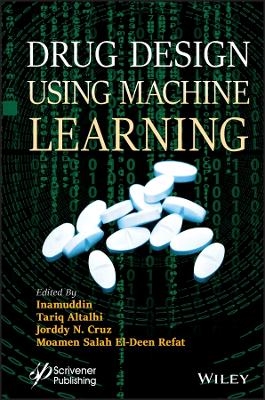
Drug Design using Machine Learning
Wiley-Scrivener (Verlag)
978-1-394-16628-2 (ISBN)
- Lieferbar
- Versandkostenfrei
- Auch auf Rechnung
- Artikel merken
The objective of this book is to bring together several chapters that function as an overview of the use of machine learning and artificial intelligence applied to drug development. The initial chapters discuss drug-target interactions through machine learning for improving drug delivery, healthcare, and medical systems. Further chapters also provide topics on drug repurposing through machine learning, drug designing, and ultimately discuss drug combinations prescribed for patients with multiple or complex ailments.
This excellent overview
Provides a broad synopsis of machine learning and artificial intelligence applications to the advancement of drugs;
Details the use of molecular recognition for drug development through various mathematical models;
Highlights classical as well as machine learning-based approaches to study target-drug interactions in the field of drug discovery;
Explores computer-aided technics for prediction of drug effectiveness and toxicity.
Audience
The book will be useful for information technology professionals, pharmaceutical industry workers, engineers, university researchers, medical practitioners, and laboratory workers who have a keen interest in the area of machine learning and artificial intelligence approaches applied to drug advancements.
Inamuddin, PhD, is an assistant professor at King Abdulaziz University, Jeddah, Saudi Arabia, and is also an assistant professor in the Department of Applied Chemistry, Aligarh Muslim University, Aligarh, India. He has extensive research experience in multidisciplinary fields of analytical chemistry, materials chemistry, electrochemistry, renewable energy, and environmental science. He has published about 190 research articles in various international scientific journals, 18 book chapters, and edited 60 books. Tariq Altalhi is Head of the Department of Chemistry and Vice Dean of Science College at Taif University, Saudi Arabia. He received his PhD from the University of Adelaide, Australia in 2014. His research interests include developing advanced chemistry-based solutions for solid and liquid municipal waste management, converting plastic bags to carbon nanotubes, and fly ash to efficient adsorbent material. Jorddy Neves Cruz is a researcher at the Federal University of Pará and the Emilio Goeldi Museum, Brazil. He has experience in multidisciplinary research in the areas of medicinal chemistry, drug design, extraction of bioactive compounds, extraction of essential oils, food chemistry, and biological testing. Moamen Salah El-Deen Refat is a professor of Inorganic Chemistry at the Department of Chemistry Science at Taif University, Saudi Arabia. He has received multiple prizes such as the Distinguished Researcher Award, Taif University from 2009-2021, Gold Medal Telesio-Galilei Academy of Science for pioneering work in chemistry in 2013, and the Arab Prize in Chemistry for Young Arab Researchers in 2010.
Preface Chapter 1 Molecular Recognition and Machine Learning to Predict Protein-Ligand Interactions
Chapter 2 Machine Learning Approaches to Improve Prediction of Target-Drug Interactions
Chapter 3 Machine Learning Applications in Rational Drug Discovery
Chapter 4 Deep Learning for the Selection of Multiple Analogs
Chapter 5 Drug Repurposing Based on Machine Learning
Chapter 6 Recent Advances in Drug Design with Machine Learning
Chapter 7 Loading of Drugs in Biodegradable Polymers Using Supercritical Fluid Technology
Chapter 8 Neural Network for Screening Active Sites on Proteins
Chapter 9 Protein Redesign and Engineering Using Machine Learning
Chapter 10 Role of Transcriptomics and Artificial Intelligence Approaches for the Selection of Bioactive Compounds
Chapter 11 Prediction of Drug Toxicity Through Machine Learning
Chapter 12 Artificial Intelligence for Assessing Side Effects
Index
| Erscheinungsdatum | 31.10.2022 |
|---|---|
| Sprache | englisch |
| Gewicht | 771 g |
| Themenwelt | Informatik ► Theorie / Studium ► Künstliche Intelligenz / Robotik |
| Naturwissenschaften ► Chemie | |
| ISBN-10 | 1-394-16628-1 / 1394166281 |
| ISBN-13 | 978-1-394-16628-2 / 9781394166282 |
| Zustand | Neuware |
| Informationen gemäß Produktsicherheitsverordnung (GPSR) | |
| Haben Sie eine Frage zum Produkt? |
aus dem Bereich


